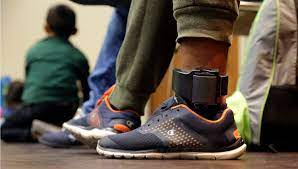Apresiding judge in Jamaica will have the authority to prescribe whether a defendant who is granted bail should wear an electronic tracking device or ankle bracelet when the new Bail Act 2022 takes effect.
The Act also states the circumstances under which a defendant may be denied bail, including those who commit murder, and if the crime was committed in certain places such as within a Zone of Special Operation (ZOSO).
Minister of Legal and Constitutional Affairs, Marlene Malahoo Forte, tabled the long-awaited Bill that will give rise to the new Bail Act in the House of Representatives on Wednesday.
Section 8 (5c) of the Bill stipulates “the wearing by the defendant of an electronic tracking device to allow for the monitoring of the movements of the defendant, being a device in accordance with such specifications and characteristics as shall be prescribed”.
Another notable provision is contained in Section 14 of the Bill, which outlines that a person who absconds while on bail faces up to five years in prison for the offence if convicted in a Parish Court and up to seven years if the conviction is before a Circuit Court. Of note is that this conviction will run consecutive to the offence for which the defendant was before the court in the first place.
A defendant is determined to have absconded if he:
- fails to surrender to custody; or
- having reasonable excuse for failing to surrender to custody, fails to surrender to custody as soon as possible after the time originally appointed for the defendant to surrender to custody.
Meanwhile, as was previously stated by Malahoo Forte, persons before the court on murder will likely have bail denied. According to Section 7 (2), bail is denied if the offence is murder and where self-defence does not arise on the prosecution's case.
According to the Bill, bail is also denied if the murder was committed within a ZOSO, in any area in respect of which a state of public emergency is in force under the Emergency Powers Act, or any area within which a cordon is established or a curfew is imposed, under section 50B of the Constabulary Force Act.
Additionally, bail could be denied where the deciding official is satisfied that there are grounds for believing that the defendant, if released on bail, would:
- fail to surrender to custody;
- commit an offence while on bail; or
- interfere with witnesses or otherwise obstruct the course of justice, whether in relation to himself or any other person.
And, bail could also be denied where a firearm was used in the commission of the offence; where the defendant came into possession of the firearm unlawfully, or where the firearm is a prohibited weapon as defined in section 2 of the Firearms (Prohibition, Restriction and Regulation) Act.
Bail may also be denied to a defendant who is charged with or convicted of an offence punishable with imprisonment if the deciding official is satisfied that the defendant should be kept in custody for the defendant's protection or, where the defendant is a child, for the defendant's welfare.
Malahoo Forte explained that one of the primary reasons why the Bail Act of 2000 is being repealed and replaced is that all statutes enacted prior to the replacement of chapter three of the Constitution of Jamaica with the new Charter of Fundamental Rights and Freedoms in 2011 must be reviewed, "especially those which engage fundamentally guaranteed rights and freedoms".
The review is to ensure they comply with the Charter.
The Bill will go to a Joint Select Committee of the Parliament before it is debated and passed into law.
Malahoo Forte, in remarks on the House floor, urged her colleagues to read the Bill carefully before making any pronouncements either way.

